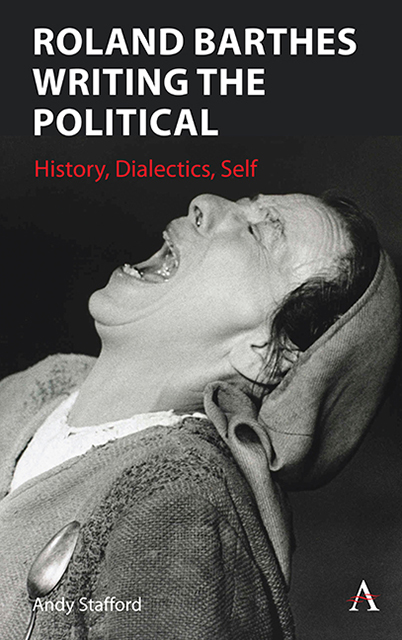Book contents
- Frontmatter
- Contents
- Acknowledgements
- Foreword
- Chapter One ‘The Dialectical Logic of Love’
- Chapter Two ‘Amorous Dialectic’
- Chapter Three ‘The People Chorus’
- Chapter Four ‘Double Grasp’
- Chapter Five ‘Stereographic Space’
- Chapter Six ‘Non-Classifiable’
- Chapter Seven ‘New Dialectic’
- Chapter Eight ‘Opacity’
- Chapter Nine ‘Undialectics’
- Afterword: Essayism and the Politics of Writing
- Bibliography
- Index
- Frontmatter
- Contents
- Acknowledgements
- Foreword
- Chapter One ‘The Dialectical Logic of Love’
- Chapter Two ‘Amorous Dialectic’
- Chapter Three ‘The People Chorus’
- Chapter Four ‘Double Grasp’
- Chapter Five ‘Stereographic Space’
- Chapter Six ‘Non-Classifiable’
- Chapter Seven ‘New Dialectic’
- Chapter Eight ‘Opacity’
- Chapter Nine ‘Undialectics’
- Afterword: Essayism and the Politics of Writing
- Bibliography
- Index
Summary
Barthes, Aesthete?
‘[T]he Neutral, for me: a manner – a free manner – to be looking for my own style of being present to the struggles of my time.’
(Barthes 2005, 8)It was once remarked to me that taking the work of Roland Barthes as ‘political’ was absurd given how much of an aesthete he clearly was. What would it mean therefore to present a ‘political’ Barthes (Zhuo 2011)? That is the challenge of this book, to affirm and investigate the politicized charge of an essayist, theorist and writer. In doing so, the analysis acknowledges but looks away from the four biographies of Barthes that have been written since his death in 1980. Calvet (1994), Stafford (1998), Gil (2012) and Samoyault (2017) all underline, to lesser or greater extent, the general dislike evident in his life and work of ‘official’ politics, including left-wing militancy and the associated hysteria it generated. There is no equivalent in Barthes's activities of a Michel Foucault leading the Groupe d’information sur les prisons (GIP) in its direct support for prisoners in French gaols.
And yet, writing was a deeply political act, from the start of Barthes's oeuvre during World War II, right up until the final lectures at the Collège de France four decades later. Forty years then of radical thought, critical theory and innovative essay-writing are to be considered as a form of political activity. In doing so, this book aims to address, if only obliquely, the perceived dichotomy between politics and aesthetics that seems to beset the ways in which critics have read Barthes's writing, to the extent that there would seem to be two very different ‘Roland Barthes’: a politicized, Marxist intellectual and a disengaged, literary aesthete. In the latter, Susan Sontag (1982, 427, 432) casts Barthes in the Oscar Wilde tradition of the aphorist, interested in the dandy and ‘camp’, a modern aesthete and excellent commentator on Fashion and fashions more generally, investigating the social and literary mask. Yet we forget Wilde's powerful arguments in favour of socialism at our peril: in The Soul of Man Under Socialism (1960 [1890]), Wilde drew on Ruskin, Shaw and Morris, in an essay as utopian as it is essayistic, to expose social alienation, in ways that a Barthes, inspired by Michelet, Fourier and Jaurès, will do too.
- Type
- Chapter
- Information
- Roland Barthes Writing the PoliticalHistory, Dialectics, Self, pp. ix - xxivPublisher: Anthem PressPrint publication year: 2022



